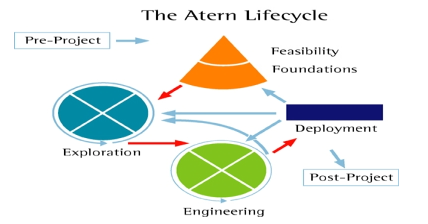Introduction
Project management is the tool of planning and organizing the resources of an organization in an effective manner for moving the task to completion. Proper planning, monitoring, and controlling support in accomplishing the objective of the entire project. With the help of close monitoring, managers can wind up the proposal within the stipulated time duration successfully (Cameron and Green, 2015). The present report will discuss the seven phases of DSDM and nine principles of dynamic system development methodology (DSDM) will be illustrated in this assignment. Avail the best assignment help online at the best prices. The strengths and weaknesses of different structures will be defined in this study. Essential qualities required of an efficient project manager will be explained in this report. Calculation of lower bound for BCWP, and upper bound for BCWP will be done in this study. Elements of the change control system will be discussed and a sample change request will be designed in this assignment.
Task 1
1.1 Project and project management
The project can be defined as a set of activities that are required to achieve the objective of the entire proposal. It may take a few days, months or years to accomplish, that completely depends upon the amount of work involved. It is designed by the manager in such a manner that the probability of failure can be reduced to a great extent (Mills and Gay, 2015). Characteristic of the project are described below:
- A project is a collaborative enterprise that involves research and designing the activities carefully so that a particular aim can be achieved. It can be defined as repetitive or non-repetitive functional work for producing a specific project.
- It has a defined beginning and closing period.
- The output of the project can be measured by proper monitoring.
Project management is the body of knowledge, skills, and tools for the project activities for meeting the needs of proposals. It falls into five groups; initiative, planning, execution, monitoring, controlling and closing. The major focus of the project manager is on time, scope, quality, risk and cost of completing the entire project. The three main phases of project management are designing, doing it and developing it.
It is a beneficial tool through which entities can analyze the situation and prepare plans in such a manner that they can get optimistic results at the end of the period. Many times project get canceled before it comes to the final stage. There are many reasons for cancellation such as over budget, time length, stakeholder benefits etc. It is essential to monitor the activities from time to time to get estimated results (Mubarak, 2015). The benefits of sound project management are as follows:
- Better efficiency in delivered services: Project management supports the project manager in completing the task within the time period. As it provides a road map no confusions take place in mid of the project.
- Increase risk assessment: In this manager of the company lines up the entire activities and procedures so the risk can be reduced and the manager can start the project at the right time.
With the help of this tool, managers can successfully complete the task and can gain positive results in the organization.
Need to Consult Directly With Our Experts?
Contact Us1.2 Measuring project's success
Success criteria are such standards through which an organization can judge the project. There are several factors on the basis of which, the manager can measure success:
- Scope: Each project has its own aim, if it is achieved at the end of the duration then it can be said that the project is successful. If the proposal has met the objectives then it can be called as successful otherwise it would be failed.
- Schedule: It is another criterion through which the success or failure of a project can be measured. It looks upon the factor of whether it has been completed on time or not, and if not then how far the project was from the estimated schedule.
- Budget: It is a major factor that influences the entire proposal. If the project has finished within the estimated budget that indicates that it has gained success but if it goes over budget then it will not be considered a successful proposal.
- Team and customer satisfaction: it is another criterion for measuring success. There are many people who are involved in the project, they put their best efforts into making it successful. If at the end of the project, all team members are satisfied with the performance of the project then it can be said that it is successful.
- Quality: It is essential to look at the quality factor, whether the actual project has reached to quality standards or not. After the completion also, quality plays a major role if it is maintained then it can be said that it is a successful project.
Winter Hungama project
It is an event which is organized by the university in the festival season. All students, teachers and principals participate actively to make it successful. In this students have designed some activities for the audience such as debates, games, and quiz competitions. For the entire project, they have decided on a budget of £1000, of which £200 is for food, £100 for guest welcome and arrangements, remaining money is allotted for the rest activities. The main objective of organizing this event is to get a return on it approx 20% of the total investment. Another aim was to successfully complete the event within the time duration. To encourage team members so that they actively participate in the activities (Dell, Newton and Petroff, 2016).
1.3 Phases and principals of DSDM
Dynamic system development method (DSDM) is a tool which focuses on delivering quick business solutions. It helps to ensure the feasibility of the project before it is created. The seven phases of DSDM are as follows:
|
Phase |
Description |
|
Pre-project |
It is the initial phase which occurs before the project gets officially started. In this stage, managers take their decision whether to start it or not. |
|
Feasibility |
It is the phase in which team members look upon the resources and time period. So that the actual viability of the proposal can be evaluated. Research is done quickly so that it does not consume too much time (Müller, and et.al, 2013). |
|
Foundation |
In this phase, managers ensure that the project is being understood effectively by all involved persons. So that authorities can set a baseline related to technology, standards before the beginning of activities. |
|
Exploration |
It is a development phase in which teams work to explore the project. |
|
Engineering |
It is the iterative development stage in which solutions to each problem are found out by the managers. |
|
Deployment |
It is the stage in which the project is almost wrapped up. In this team compare the requirements with fulfillment in the projects. |
|
Post project |
In this project has been created, and now it is maintained by the team members. |

Nine principles of DSDM are as follows:
Focus on business needs: It concentrates on the business needs and managers have to focus on business priorities.
- Deliver on time: Time boxes need to be planned in advance by the team so that they can complete the project on time without any failure.
- Collaborate: All team members need to work as a team, it helps in developing better understanding and speed (What is DSDM? 2017).
- Never Compromise on Quality: Quality is the major factor that needs to be focused on by the team members.
- Build incrementally from firm foundations: Enhance the confidence of stakeholders and take timely feedback so that project analyses can be done significantly.
- Develop iteratively: it might be possible that managers have to modify the work. They have to confirm that the solution is right for a particular task.
- Communication: Face-to-face interaction helps to increase understanding and reduce confusion.
- Demonstrate control: It is necessary to make effective control and monitoring over the activities so that it can meet the business objectives.
1.4 Pull the plug on the project
Sometimes times project manager has to take cost effective actions that are pulling the plug to close the project. It is a very difficult decision for the project manager because I can harm the image of the organization. Staw and Ross have given several reasons why managers have to take such decision and why it is required to be abandoned. Several reasons are described below:
- The nature of the project is the main reason, there are many projects in which some temporary problems are attached. When these issues arise the manager tries to end the project before it creates major problems (Barry M. Staw and Jerry Ross, 2017).
- High closing cost is another reason because this organization can not get high salvage value.
- The establishment of commitment is too well that allows closure to be contemplated.
- Psychological factors such as motivation, rewards etc. can create this situation.
- Intermittent rewards give a positive sign that overall things can be improved.
- Social pressure is another reason that leads to pulling and plug on projects.

Stuck with your Assignment?
Hire our PROFESSIONAL ASSIGNMENT WRITERS and Get 100% Original Document on any Topic to Secure A+ Grade
Get Assignment Help
Task 2
2.1 Strength and weakness of different structures
To complete a project successfully, organizations adopt some specific structure so that they can finish their project on time with full efficiency.
Functional structure:
It is the type of structure in which project managers follow the tall or hierarchical structure. The manager has technical knowledge and have ability to lead the team. Each functional unit is responsible for its functions and charged components (Knapp, Vangelisti and Caughlin, 2014). Team members need not report to different authorities, they all report to one single functional manager.
Strength
- It is very beneficial for small projects because managers can have effective control over their team members and can allot the required resources to them.
- Access to the experts is very easy because they all work in the same functional area.
- In a functional structure, all components are arranged in a systematic manner so whenever any problem arises then it is easy to get everyone together to resolve the problems of any project (DuBrin, 2015).
- All persons who are involved in the project have equal education and they are experts in their field so the project can be completed on time and can be able to accomplish its objective.
Weaknesses
- As in such type of project structure each unit pays less focus on the actual project and to fulfil their basic needs responsibility towards the project is being ignored by the project team.
- There is a limitation as a project manager can not have access to outside people of their functional division.
- As each component members perform their own work and they are loyal towards their department, they are not concerned about the entire project which may create a conflict situation in the organization (Burke and Barron, 2014).
Project-based structures
It is the structure in which the company focus on creating an individual team for a specific project and management of this team is separated from other functional units of the organization.
Strength:
- A project manager is the completely responsible person for the entire proposal and all members report to the project manager and multiple leadership is being ignored.
- All project team members work with full power and cohesion, they share their views and complete the project on time (Snell and Brown, 2014).
Weaknesses
- If the firm is engaging in many projects, then there is a high chance of duplication of efforts.
- Hiring a separate team for a single project is an expensive method, it is only possible in big-budget projects.
Matrix structures
It is a mixture of functional and project-based structures. In the functional matrix, functional managers have more power to take any decision as compared to the project manager, whereas in the project matrix power is in the hands of the project manager.
Strength
- Resources can be utilised effectively by sharing them in multiple projects.
- As all members use the same method for the different projects it is easy to move from one to other project by the team members.
Weaknesses
- Conflicts can arise at any time, members may fight for resources or others.
- As in this, managers have to coordinate with other different departments so decision-making may take a long time (Verburg, Bosch-Sijtsema and Vartiainen, 2013).
2.2 Difficulty faced by project manager
There are several challenges which are faced by the project manager:
Unrealistically deadlines: When a project manager has to deal with an IT project then it is necessary to do market research and they have to test the software many times until it gives accurate results. It is difficult to complete an IT project within a short period and when a company gives an unrealistic deadline then it creates difficulty for the project manager (Hwang and Ng, 2013).
Insufficient team skill: As in IT projects it is essential to have extraordinary technical skills in the team members. So that they can perform their work significantly. However if employees do not have sufficient skills then the project manager has to face challenges because it is not possible to train them during the project, if the manager gives time for training then an individual will fail to meet the deadline.
Undefined goal and vision: It is another challenge for the project manager at the time to control the IT projects. If the requirements of consumers are not clear then individuals will not be able to define the objective or goal of the project (Head and Alford, 2015). That would enhance the chances of failure. So in such a situation, difficulty is created for the project manager and the individual has to control this condition smartly.
2.3 Qualities of project manager
The project manager can be called efficient if the individual has some qualities:
- Good communicator: The project manager has to coordinate with the team members and have to circulate necessary information on time to them. It is essential that the person have communication skills otherwise, a person will not be able to make others understand the project goal.
- Integrity: Individual needs to be honest, and loyal towards the organization. Project managers should focus on maintaining ethical standards (Verzuh, 2015). That would help in completing the project significantly.
- Problem solving: Many times sudden problems take place in the middle of the project, in such a situation it is necessary that project manager find appropriate solutions and complete the tasks with efficiency.
- Look forward: Forecasting capability is the essential symptom of an efficient project manager. If an individual is able to forecast future activities then the person will be able to minimize the failure risk. That would help in accomplishing the project on time.
- Experience and knowledge: It is necessary and a sign of a good project manager. Individual needs to have knowledge about the field and need to have experience of the same. In this way manager will be able to complete the project successfully.
2.4 Building an Efficient Project Team
To complete the project on time and to accomplish the real goal of the proposal it is essential to have the support of effective team members (Verzuh, 2015). An efficient project team can be built by the following ways:
- Recognition of the power of teamwork: The project manager has to recognize the actual power of teamwork. They have to look upon the team working in this way goal of the project can be accomplished.
- Selection of the right people: If the project is IT then the manager needs to include technical experts, whereas if the project is of construction then the individual needs to include engineers in the project. In this way, team members will be able to perform their duties well and that would help in successfully completing the project.
- Delegation: Delegation of authorities will help in building an efficient team for the project. Managers can work with the team members so that they perform their work significantly and minimize their mistakes (Head and Alford, 2015).
- Share calendars: As manager has to make them aware of the deadline so that all members focus on it perform their duties well and complete the allotted task on time.
- Monitor progress: It is another step in which project manager needs to monitor the working activities from time to time so that their mistakes can be identified immediately and the manager can change their responsibilities effectively. In this way right person will do the right job which would help in completing the project with quality (Burke and Barron, 2014).
References
- Burke, R. and Barron, S., 2014. Project management leadership: building creative teams. John Wiley & Sons.
- Cameron, E. and Green, M., 2015. Making sense of change management: a complete guide to the models, tools and techniques of organizational change. Kogan Page Publishers.
- Dell, A. G., Newton, D. A. and Petroff, J. G., 2016. Assistive technology in the classroom: Enhancing the school experiences of students with disabilities. Pearson.
- DuBrin, A. J., 2015. Leadership: Research findings, practice, and skills. Nelson Education.
- Head, B. W. and Alford, J., 2015. Wicked problems: Implications for public policy and management. Administration & Society. 47(6). pp.711-739.
- Hwang, B. G. and Ng, W. J., 2013. Project management knowledge and skills for green construction: Overcoming challenges. International Journal of Project Management. 31(2). pp.272-284.


 Company
Company













